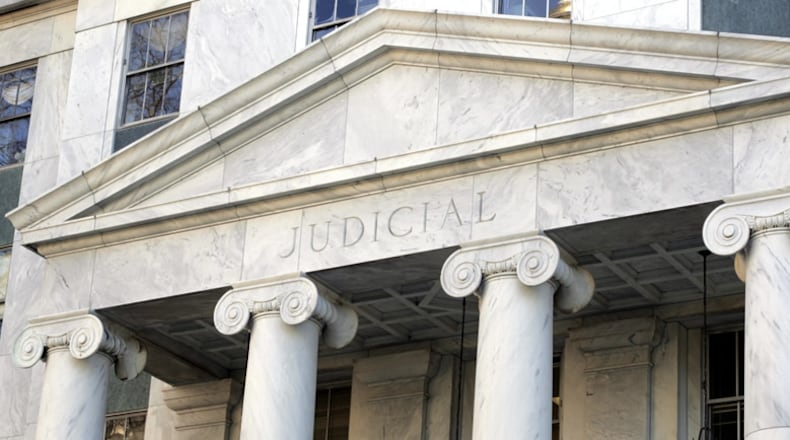The Georgia Supreme Court on Monday found that Fulton County has been improperly compiling names of residents for its jury pool, a ruling that could create chaos in the busy court system.
It also could affect the outcome of the Atlanta Public Schools test-cheating case. Shortly before the months-long trial, which resulted in the convictions of 11 teachers and administrators, defense lawyers unsuccessfully raised the same issue.
“This could be far-reaching,” said Vernon Pitts, who heads Fulton’s public defender office. “Our review is going to be done on a case-by-case basis. It could affect the selection of juries and indictments, because the constitution of the grand jury is thrown into question by this ruling.”
The court ruled, in effect, that a private company hired by Fulton’s courts had improperly removed names from the eligible jurors’ list while improperly adding others. This violated well-established rules that were put in place years ago to ensure uniformity in the state’s jury pools, the court said.
"This ruling could cast doubt on the verdicts in the APS case," said Decatur lawyer Bob Rubin, who argued the jury motion on behalf of his client, former principal Dana Evans. "I don't know exactly what it means for the APS defendants. But it can only be good news."
Pitts, whose office is preparing motions for new trials for several APS defendants, said the issue will be raised in those cases. In his challenge, Rubin had argued that African-American residents were underrepresented in the jury pool.
Marietta lawyer Ashleigh Merchant, a former Fulton public defender, said the high court’s ruling does not automatically mean the APS defendants will get a new trial. That’s because the court found the county had violated a court rule, not a constitutional principle, such as the right to a fair trial.
In fact, in a footnote in its decision, the Supreme Court said it was not at this time addressing whether the county’s jury pool violation “would be deemed reversible or prejudicial error” — grounds for overturning a conviction on appeal.
In a statement, the Fulton District Attorney’s Office said cases that resulted in convictions, such as the APS case, must be reviewed “to determine whether any prejudicial mismanagement of the (jury) list occurred.”
The court ruled in favor of a motion filed on behalf of Otis Ricks, who is charged with murder, armed robbery and other crimes for the Aug. 16, 2012, shooting death of a woman at O.T.'s Lounge and Grill. Fulton prosecutors are seeking the death penalty against Ricks.
“We are glad the court has told the county to correct this behavior,” said state capital defender Emily Gilbert, one of Ricks’ lawyers, said.
The court’s 46-page ruling, written by Justice David Nahmias, said the county has been ignoring rules set in recent years to create modern-day and uniform methods of preparing lists from which local courts select grand juries and trial juries. The court gave the county specific directions to follow so it will be able to comply with the so-called “jury composition rule.”
The rule replaced the previous juror compilation process that allowed each of Georgia’s 159 counties to control their own lists. Under the new arrangement, the state Council of Superior Court Clerks prepares each county’s master list and updates it on an annual basis. It uses voter registration, driver’s license and identification card records to determine eligible jurors. It also obtains records of those ineligible to serve, such as convicted felons, the deceased, non-U.S. citizens and those found to be mentally incompetent.
Rather than using the jury list produced by the clerks’ council, however, Fulton has used its own jury list developed by the county’s private vendor, Courthouse Technologies, the ruling said. In court filings, the county said it is required to have a jury management system and decided to use a vendor, because creating its own system would have been “very costly.”
The court found that Courthouse Technologies improperly added 1,000 names to the master jury list provided by the clerks’ council. It also found that the company improperly removed tens of thousands of names. These included potential duplicates of names on the county’s juror list, which it was not authorized to remove, the ruling said.
“The cost of sending two summonses to the same juror must be weighed against the cost of eligible jurors not being called for service because their identifying information is similar to others,” Nahmias wrote.
The ruling noted that Ricks’ jury expert, Jeff Martin, who also testified in the APS jury challenge, spot-checked the names of four eligible jurors — his and three of his brothers. He found that his name and two of his brothers’ names had shown up as duplicates and been removed from possible jury selection.
In its statement, the DA’s office said the ruling does not affect the state’s ability to put Ricks on trial. It also “provides valuable instructions to the jury clerk with respect to the county’s master list.”
“My office is committed to working with the Superior Court and the jury clerk’s office to make sure the management issues raised by the Supreme Court will not curtail the trial process in our county,” DA Paul Howard said.
Superior Court Administrator Yolanda Lewis said officials were reviewing the ruling to determine an appropriate response and plan of action.
About the Author
The Latest
Featured






